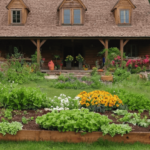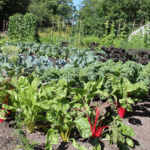Organic farming has taken the agricultural world by storm, transforming the way we view and interact with food production. In an era where consumers are becoming increasingly health-conscious and environmentally aware, organic farming presents a compelling alternative to conventional farming practices. Defined by its rejection of synthetic pesticides, herbicides, and fertilizers, organic farming emphasizes natural processes and ecological balance. This holistic approach prioritizes soil health, biodiversity, and sustainability, aiming to create a harmonious system that produces nutritious food without compromising the environment.
Organic farming is more than just a method of growing crops; it’s a philosophy rooted in respect for nature and a commitment to sustainable practices. It presents a pathway toward healthier food systems and a more resilient agricultural landscape. But what exactly sets organic farming apart? And what should aspiring organic farmers understand before venturing into this rewarding yet challenging field? This article explores the core principles of organic farming, delves into its practices, and sheds light on why it has become an essential pillar in modern agriculture.
Core Principles of Organic Farming: Sustainability, Soil Health, and Biodiversity
At its heart, organic farming is governed by principles that prioritize ecological well-being and long-term sustainability. These principles are not merely guidelines; they form the foundation upon which organic farming stands, influencing every decision and action taken on an organic farm. Let’s take a closer look at three key principles that define organic farming:
Sustainability
Sustainability is the backbone of organic farming. Unlike conventional agriculture, which often relies on external inputs such as chemical fertilizers and pesticides, organic farming seeks to work with nature rather than against it. Organic farmers focus on creating systems that can regenerate themselves, reducing dependence on non-renewable resources and minimizing environmental impact. This commitment to sustainability means that organic farms are designed to be resilient, using renewable resources, conserving water, and reducing greenhouse gas emissions.
Organic farming practices, such as crop rotation, cover cropping, and natural pest control, help maintain the farm’s productivity without depleting natural resources. These methods promote a balance between agricultural production and ecosystem health, ensuring that farming can continue for generations without causing harm to the environment.
Soil Health
Soil is the lifeblood of any farm, but in organic farming, it takes on an even greater significance. Organic farmers view soil as a living ecosystem rather than a mere medium for plant growth. Healthy soil is teeming with microorganisms, fungi, and organic matter, all of which contribute to plant health and productivity. To build and maintain fertile soil, organic farmers use natural amendments like compost, manure, and green manure crops, which enrich the soil with essential nutrients.
Avoiding synthetic fertilizers is crucial to this process, as these chemicals can disrupt the delicate balance of soil life, leading to long-term degradation. Instead, organic farming relies on practices like crop rotation and intercropping, which enhance soil structure, prevent erosion, and reduce nutrient depletion. By fostering soil health, organic farming not only improves crop yields but also reduces the need for chemical interventions, resulting in a healthier environment and more nutritious produce.
Biodiversity
Biodiversity is a fundamental aspect of organic farming, with organic farmers actively working to create diverse ecosystems within their farms. This diversity is achieved through a combination of planting a wide variety of crops, maintaining natural habitats, and encouraging beneficial insects and animals. Diverse farms are more resilient to pests and diseases, reducing the need for synthetic pesticides.
By promoting biodiversity, organic farmers create a balanced ecosystem where natural predators help control pests, and a variety of plants can thrive without excessive competition for resources. This approach not only benefits the farm but also contributes to the preservation of local wildlife and plant species, supporting overall ecosystem health.
Essential Practices in Organic Farming: Methods That Promote Health and Productivity
Organic farming isn’t just about what farmers don’t do (such as using chemicals); it’s also about implementing specific techniques that promote the health and productivity of crops and livestock. These methods are designed to align with the principles of sustainability, soil health, and biodiversity. Here are some of the core practices in organic farming:
Crop Rotation and Intercropping
Crop rotation is a cornerstone of organic farming. By rotating different crops in the same field from season to season, farmers can prevent soil nutrient depletion and reduce the risk of pests and diseases that thrive when the same crop is planted repeatedly. For example, a farmer might plant nitrogen-fixing legumes one season and then follow with a crop that requires high nitrogen levels, such as corn. This rotation naturally replenishes the soil, reduces the need for chemical fertilizers, and helps maintain soil structure.
Intercropping, on the other hand, involves growing two or more crops in close proximity, benefiting from their interactions. For example, planting nitrogen-fixing beans alongside corn can improve soil fertility and yield. Intercropping also enhances biodiversity on the farm and can be used strategically to manage pests, as certain plants can repel insects harmful to neighboring crops.
Natural Pest and Disease Control
In organic farming, pest and disease control are managed through preventive measures and natural methods. Organic farmers use integrated pest management (IPM) techniques, which include crop rotation, encouraging natural predators, and using pest-resistant plant varieties. In cases where additional control is needed, organic farmers use organic pesticides derived from natural sources, such as neem oil or garlic extract, which are less harmful to the environment and non-target species.
Promoting natural predators, such as ladybugs and predatory wasps, is also common in organic farming. These beneficial insects keep harmful pest populations in check without disrupting the ecosystem. By working with nature rather than against it, organic farmers create a balanced environment that supports crop health.
Soil Fertility Management
Maintaining soil fertility is essential for the success of organic farms. Organic farmers enhance soil fertility by using compost, green manure (cover crops like clover and alfalfa), and animal manure, which add organic matter and nutrients back into the soil. These natural fertilizers improve soil structure, water retention, and microbial activity, resulting in healthier and more resilient crops.
Composting is an especially valuable practice, as it recycles organic waste, reduces the need for chemical fertilizers, and minimizes greenhouse gas emissions. Organic matter in compost nourishes soil microorganisms, which break down nutrients into forms that plants can readily absorb. This sustainable approach to soil fertility management helps organic farmers produce high-quality crops without depleting the soil.
The Benefits and Challenges of Organic Farming: What You Need to Know
While organic farming offers numerous benefits, it also presents unique challenges that require dedication, knowledge, and adaptability. Understanding these benefits and challenges is essential for anyone considering a transition to organic farming.
Benefits of Organic Farming
Organic farming offers multiple benefits for the environment, consumers, and farmers. Here are some of the key advantages:
- Environmental Health: By eliminating synthetic chemicals, organic farming reduces pollution, protects water resources, and conserves biodiversity. It also helps mitigate climate change by promoting carbon sequestration in soil.
- Nutritional Quality: Organic produce often contains higher levels of certain nutrients, such as antioxidants, and is free from pesticide residues, making it a healthier choice for consumers.
- Economic Opportunities: With increasing consumer demand for organic products, organic farming offers significant market potential, allowing farmers to command higher prices and increase profitability.
- Improved Soil Health: Organic farming practices enhance soil fertility and structure, creating a long-term foundation for sustainable crop production.
Challenges of Organic Farming
Despite its many benefits, organic farming is not without its challenges. Some of the key obstacles include:
- Labor-Intensive Practices: Organic farming requires more hands-on management, particularly for weed control, pest management, and soil care, which can increase labor costs.
- Lower Yields in Transition Period: Farmers transitioning from conventional to organic methods may experience lower yields initially as the soil and ecosystem adapt to new practices. This can be financially challenging for small-scale farmers.
- Market Access and Certification: Achieving organic certification requires adherence to strict standards, which can be costly and time-consuming. Additionally, reaching markets willing to pay premium prices for organic produce can be challenging, particularly in areas with limited consumer awareness.
- Climate and Pest Risks: Organic farms are more vulnerable to unpredictable weather and pest outbreaks. Without chemical solutions, farmers must rely on biodiversity and ecosystem health to manage these risks, which requires careful planning and sometimes luck.
Conclusion: The Promise of Organic Farming
Organic farming represents a powerful shift toward healthier food systems, environmental stewardship, and agricultural sustainability. For farmers, it’s a journey that requires commitment, passion, and a deep understanding of ecological principles. By prioritizing soil health, biodiversity, and sustainability, organic farmers are setting a standard for a resilient future, one that respects nature’s balance and nurtures the land for future generations.
For those embarking on the path of organic farming, understanding its principles, practices, and challenges is essential. While organic farming demands dedication and labor, its rewards—for farmers, consumers, and the planet—are undeniably profound. As the organic movement continues to grow, it offers hope for a world where farming can thrive without harming the environment, producing food that sustains both people and the planet in harmony.
The organic revolution has begun, and with each new organic farm, we are one step closer to a future where agriculture and nature flourish together.










